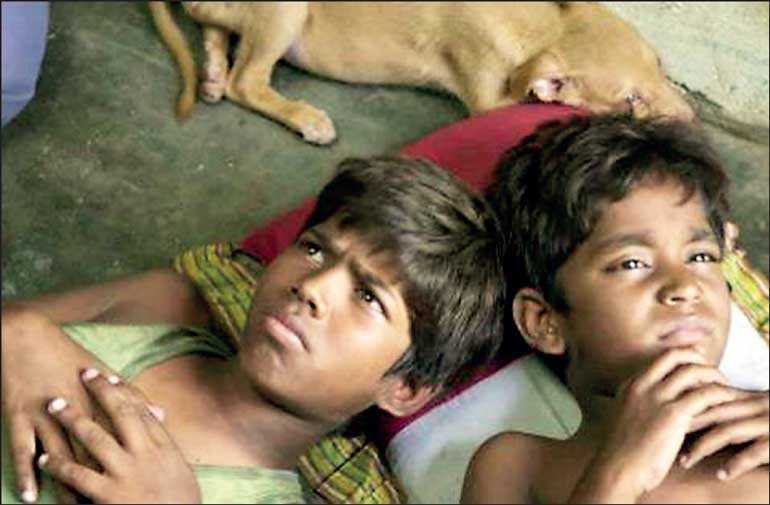Thursday Feb 19, 2026
Thursday Feb 19, 2026
Wednesday, 28 August 2019 00:00 - - {{hitsCtrl.values.hits}}

‘Kaaka Muttai’ (The Crow’s Egg): The poor under globalisation and neoliberalism?
‘Kaaka Muttai’ (The Crow’s Egg) is an excellent Tamil-language film recently shown on SBS TV  (Australia), as part of World Movies, with English subtitles, that depicts some of the predicaments of the poor, particularly the children growing up under globalisation and neoliberalism in a satirical manner.
(Australia), as part of World Movies, with English subtitles, that depicts some of the predicaments of the poor, particularly the children growing up under globalisation and neoliberalism in a satirical manner.
Written, directed and filmed by N. Manikanadan as a debut in Chennai in 2015, it has gained several international accolades for its story, message, sensitivity and artistic qualities.
The story with the background of slum dwellings in Chennai, Tamil Nadu, revolves around two boys who become obsessed with tasting a piece of pizza. Pizza here is the symbol of globalisation. The two are brothers who live with their mother and grandmother, the father being in police custody for some unknown reason. They all love each other very much.
It is praiseworthy that Manikanadan in fact has chosen two slum kids to act in his film, J. Vignesh and V. Ramesh, as the two brothers. The mother’s role is played by Aishwarya Rajesh, a well-known actress.
While the mother struggles to find money to get the father released on bail, the two kids get influenced by pizza advertisements in the area and on TV. Both are ingenious kids who behave reasonably well, influenced by their mother’s ethical orientation. She has a principle not to hit her kids and humour is her disciplinary tactic.
How did they get TVs, while being and living in a dirty slum? Undoubtedly, neoliberalism has a ‘trickledown’ effect! Or is it a lingering ‘welfare-measure’ coming from M.G. Ramachandran’s era? They in fact have two TVs! Not only the mother, but also the grandmother gets a free TV during the election time being ration-card holders. While watching TV commercials on pizza, the two kids salivate in the presence of the grandmother.
Granny tries to appease the greed or the desire of the two kids by trying to imitate a pizza by using dosa as the batter-base, and topping it with tomato slices, capsicum and onions. She tries her very best, but the boys are obviously not satisfied. Only their pet dog eats it. The two kids cannot understand why their mother or grandmother cannot supply what they want – be it pizza, toys or eggs. This is the predicament of poor kids all over the world.
What are the names of the two kids? No one knows the real names, the elder being called ‘Periya Kaaka Muttai’ (Big Crow’s Egg) and the other, ‘Chinna Kaaka Muttai’ (Little Crow’s Egg). The names are given because they are well known for collecting crows’ eggs and drinking them for extra strength and vitality. They are school dropouts given their abject poverty. Otherwise it is said that Chennai schools supply eggs to poor school kids at lunch time. They are ingenious in collecting crows’ eggs from nests.
The opening of a pizza spot near their slums is a big event. Perhaps that was the only empty land available for the newly-rising businessman (under neo-liberalism, I would say), to erect the new building for that purpose. This is what the kids’ mother later questions from the authorities, asking, “Why did you allow opening of a pizza spot near our slums, tormenting our children?” All the slum kids go to see the event, from a distance of course, inaugurated by a popular film star Simbhu.
The two Eggs’ appetite increases. They get a leaflet and call 3888 3888 for pizza delivery, thinking it might be within their means. They do earn some money by collecting and selling dropped coals from goods-trains to a collection shop. (They live near a railway line). But the price is Rs. 300! The receptionist asks for their address! Do they have one? They are confused. They ask the granny and she is more confused. “We are near Mariamman Temple,” is her answer. They fear to ask the mother because then she knows the two are up to some mischief.
Having sympathised with the boys’ predicament, their friend-mentor, a railway lineman, shows where the Railway Department keeps some coal in store. His name is ‘Fruit Juice’. They take coal chunks little by little and ask their mentor: “Are we stealing?” “No, you are just taking,” is the answer. For that advice, their mentor-lineman loses his job. All these episodes are depicted in extremely humorous manner.
After earning enough money, they go to the Pizza Spot. They are chased away by the security, staring at their clothes. They are now puzzled about their dress. For the second attempt, they find some good clothes, without stealing, but ‘doing business’ with two rich kids in Mylapore. This is part of the central city of Chennai. In contrast to pizza, the two rich kids were after pani puri, which their father forbids for hygienic reasons. They exchange pani puri for new clothes.
The ‘Two Eggs’ make a second attempt in good clothes to buy pizza. Alas! Having recognised them as slum kids, the Manager assaults the ‘Big Egg’ and he falls. This is videoed by some other kids for fun, and goes viral under positive developments of globalisation and technology transfer. The two poor kids have further disappointment by losing their grandmother when they come home.
After the funeral, they run away from home being scared of thugs that the businessman has sent. The pizza businessman makes all efforts to thwart the news and the video spreading, but several TV channels jump on the opportunity. “It is a human rights issue,” his business advisor declares.
The film reveals the despicable connections between the businessman/men, the local politicians, the area thugs and the police in uncertain terms. These are very common in many South Asian countries, similar to the film’s surroundings, characters and incidents. The poor are their virtual instruments of their games.
Having failed to stop the news and the video, the businessman brings the two kids through the police to the Pizza Spot. This is peace-making and reconciliation. The arrangements are similar to the opening ceremony where the movie star Simbhu participated.
The two kids, accompanied by the mother, are extremely puzzled. A TV journalist asks the businessman, “Is this a business gimmick?” The businessman says, “No, I apologise for the incident. I don’t make a distinction between the rich and the poor.” These are typical of neoliberal pronouncements. The reality is the difference.
The businessman offers pizza to the two kids and in fact feeds them. Their appetite is really gone. Faces are woeful. Periya Muttai asks Chinna Muttai: “Do you like it?” Yuck is the answer. “Granny’s dosa-pizza was much better,” he adds.
(One may compare ‘Kaaka Muttai’ with ‘Slumdog Millionaire’. However, KM is more realistic and meaningful than SM in my opinion. It is down to earth to the South Asian conditions and contradictions of globalisation.)